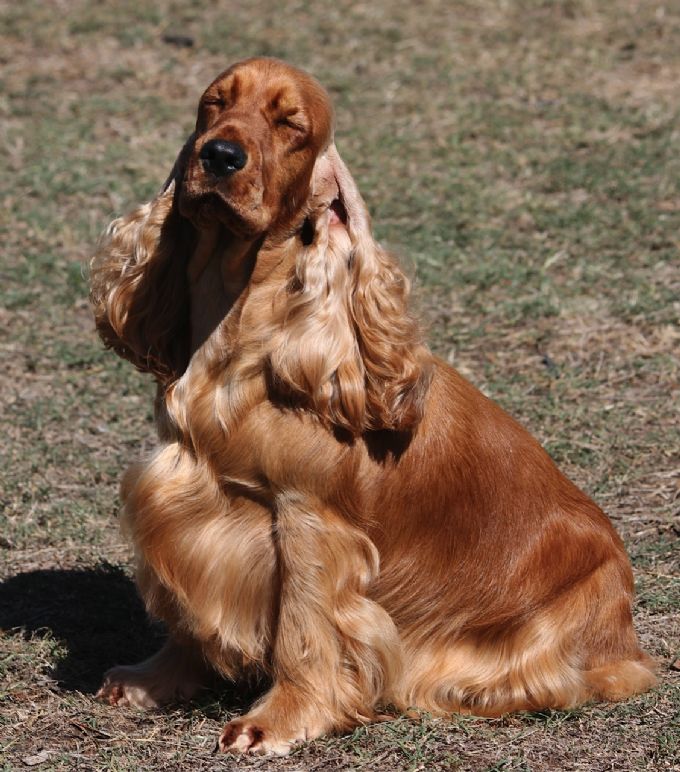Eye Conditions

Supreme Ch / Neuter Ch Macdolly G L A M O R O U S
PRA (Progressive Retinal Atrophy)
An inherited eye disease found in many breeds of dogs with varying ages of onset. There are various types of PRA but the one most commonly seen in Cockers is GPRA (General Progressive Retinal Atrophy) also known as prcd-PRA. This results in night blindness gradually leading to total blindness.
In Cockers, PRA has a variable age of onset, from as early as 18 months to as late as 7 years. It is inherited as a simple Autosomal Recessivegene, meaning that a copy of the PRA gene must be inherited from both parents for the disease to occur. With recessive conditions like PRA, there are 3 genetic categories, affected, normal and carriers. Affected animals have two copies of the faulty PRA gene, one inherited from each parent. Carrier animals have one faulty copy of the PRA gene but appear perfectly healthy and cannot be distinguished from normal dogs by eye screening. Normal animals are entirely free of the faulty gene.
The difficulty was that until recent years breeders had no way of identifying which category their breeding stock fell into as the only screening test available in the UK (eye testing by a BVA Panellist) could only determine if a dog was clinically clear of the disease at the time of testing. It could not determine whether the dog was a carrier or whether the dog would go on to develop the disease at some time in the future. For some time, a marker gene test for prcd-PRA had been available from the American company, Optigen which gave a good indication of the status of dogs tested. Optigen then identified the mutation gene which causes prcd-PRA in English Cockers and this test is now available to breeders in the UK & Europe as well as in the US, enabling breeders to identify whether their dogs are genetically clear, carriers or affected with the disease.
Dogs which have been prcd-PRA DNA tested as either Carriers or Affecteds should only be mated to dogs which have been DNA tested as Clear/Normal to avoid producing affected progeny. More information on breeding strategies for the prcd-PRA test can be found HERE.
Retinal Pigment Epithelial Dystrophy (RPED):
This is the condition previously known as CPRA (Central Progressive Retinal Atrophy). Recent research has shown that this disease in Cockers is associated with an inherited metabolic inability to circulate Vitamin E around the dog's system. This results in a central loss of vision but not usually total blindness (affected dogs still maintain peripheral vision). Supplementation with Vitamin E can apparently help in stopping further development of the condition. It is not yet known exactly how this genetic defect is inherited and no DNA test is currently available.
Primary Glaucoma: This is a very painful condition caused by a build up of internal fluid pressure in the eye due to an inherited abnormality of the drainage angle. An affected dog will go blind (and surgery to remove the affected eye or eyes is often necessary). Predisposition to Glaucoma can be determined by the Gonioscopy test as part of the BVA/KC eye testing scheme. Current advice is that gonioscopy is performed at approximately 1, 4 and 7-8 years of age, The BVA/KC/ISDS Eye Scheme is currently trialling a pilot scheme of gonioscopy grading which allows for more informed breeding decisions. Under this pilot scheme, dogs are either classified as Grade 0 (unaffected), Grade 1 (mildly affected), Grade 2 (moderately affected) or Grade 3 (severely affected). For breeding advice, click HERE for an explanatory article from the Kennel Club (pdf file)
This information has been sourced from http://www.thecockerspanielclub.co.uk/health.htm the parent Club of the Breed in the UK.
Contact Details
Terri, Denise, HeathBrisbane, QLD, Australia
Phone : +61431833699
Email : [email protected]
